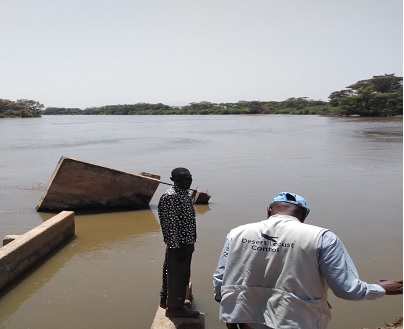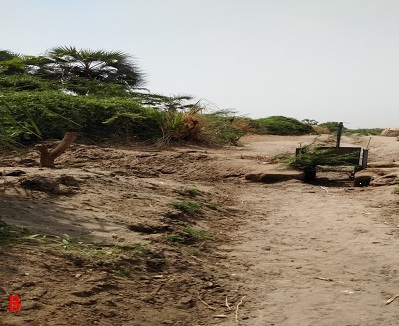Experts have documented Reconnaissance report on the Turkana County's potential for mass production of high-value crops, according to a report prepared by FAO, Egerton University and Turkana County Government.

Pictures showing the Arid and semi-arid region of Northern parts of Kenya. The Research by Egerton University led by Agro-Science Park Director Professor Paul Kimurto is to find crops that can do well in such areas. (Photo: Kurian Musa/ Egerton University)
The report recommends both irrigated areas of over half a million acres with over 20 irrigation schemes and rainfed agricultural areas. The study involved 39 major irrigated/agricultural sites in Turkana West, Turkana East, Loima and Turkana Central sub-counties and irrigation schemes in Loima and Turkana Central sub-counties along Turkwel River and in Turkana East along Kerio River and rainfed areas in Turkana West sub-counties. Focus was given to production areas around Kalobeyei Refugee Settlement and selected host community sites. Once fully exploited, this will drastically reduce the perennial food and nutritional-insecurity, hunger and famine witnessed in Turkana County frequently.
The recommended crops which high yields and adaptability included groundnuts (Mwangaza and Ndovu), Sunflower, Soya beans, Cowpeas, Local and improved sorghum (Elkari, EUSV1), Watermelon (F1 sukari), Tomatoes (Rio Grande) and Green grams. Turkana County Government, Egerton University, and the Food and Agriculture Organization (FAO) jointly conducted a two-year piloting program that identified several irrigation schemes managed by both National irrigation Authority-NIA, led by Eng Felix Sheundu which include Kangalita, Nanyee, Kotela, Naipa, Nawapeto, Katilu, Nakwamoru, Morulem, Lokubae, Elelea, and Nadoto irrigation schemes among others as potential schemes with suitable soils, water supply and .
Ag. Director for Agriculture Victor Lochee, speaking at Lokichoggio, appreciated Egerton University and FAO for facilitating the two-year research and assured of the government's readiness to implement the findings. He asked for more support towards the realization of the County's agenda on food security. He informed the conference participants of new Governments plans headed by Governor H.E Hon. Jeremiah Ekamais Lomorukai Napotikan to stock over 2000 bags of staple foods for food reserve.
He outlined the department plans on increasing the acreage for crop production and singled out the Mathenge (Prosopis Juliflora) invasion in most irrigation schemes as the greatest challenge that has slowed down production. The solution, Director Lochee said, requires a multi-sectoral approach from the County Government and the private sector in mobilizing adequate resources that can be used to uproot the Mathenge plant. Other challenges that needed attention according to report were non-utilization of productive land that is wasted and has the potential to be lost completely due to Mathenge invasion, neglect of productive land by the owners and destruction by floods and livestock.
Egerton's University team lead and Project PI, Professor Paul Kimurto acknowledged and appreciated the opportunity and space given to them by the County Government of Turkana and FAO to carry out research, crop trial piloting, cost-benefit analysis (CBA), potential for mechanization and deployment of hand held motorized equipment and also capacity building of extension staff and establishment of community seed systems for sustainable seed supply. Prod Kimurto assured of the institution's readiness to continue widening research partnerships with all stakeholders in the County, including Turkana University, NIA and processors including INSTA processors Company Ltd, EPZ Nairobi. He noted that groundnut had low Aflatoxin of between 2-4pbb which is within the European and exports standards which should be below 10pbb. Egerton team members who participated in the workshop presentations include Bernard Towet, Dr Miriam Charimbu, Nancy Njogu, Lilian Jeptanui and Dr Hillary Chakava.
Elizabeth Kamau the Program lead from FAO thanked Egerton University for the good research and presentation of good results during the workshop. She called for the involvement of youth and women in the lucrative business of groundnuts production, value addition, soyabean and sunflower oil extraction, mechanization services including tractor services, groundnut shelling, and contract farming under community seed systems. She also underlined the need to upscale the current subsistence crop production in Turkana into commercial level and agro-processing level.
She thanked IKEA Foundation and European Union for funding the projects which support value chain development within the Kalobeyei Integrated Social and Economic Development Program (KISEDP) that hosts about320000 Kakuma Refugees and Turkana Host community.
Others who spoke during the last day of the Agriculture workshop in Lokichoggio included County Director for Cooperative Benson Akol, FAO's Head of Kakuma Sub-Office Francis Ekiru Anno, Head of FAO Lodwar office Ambrose Ngetich, Mr Ogota the county extension officer, Eng Felix Sheundu, the head of NIA Turkana County, County head of Mechanization Mr Juma, and Turkana University's Director for Partnership and Research Dr. Tioko Logiron.












